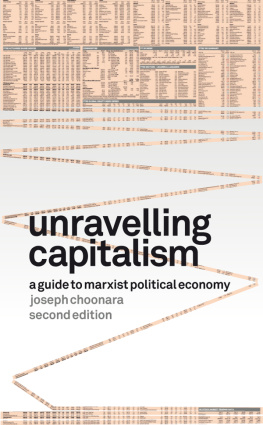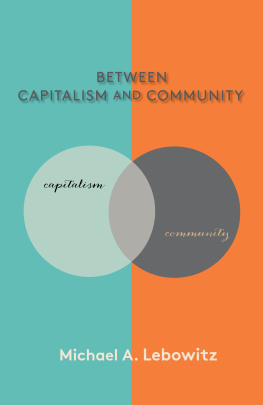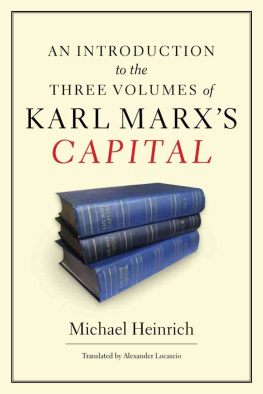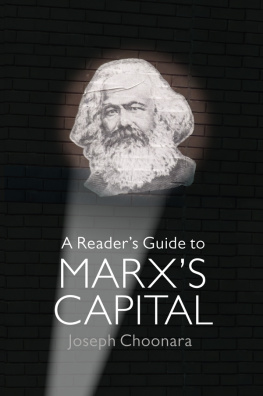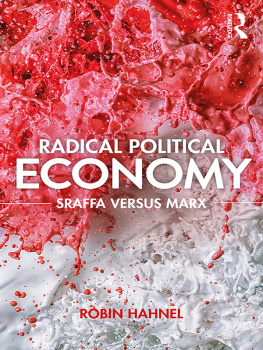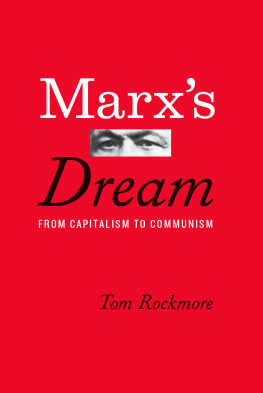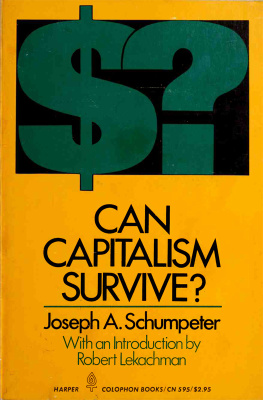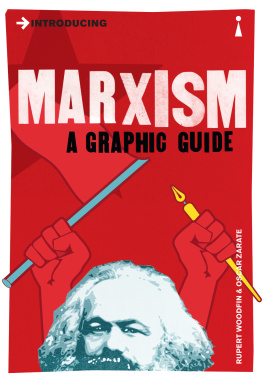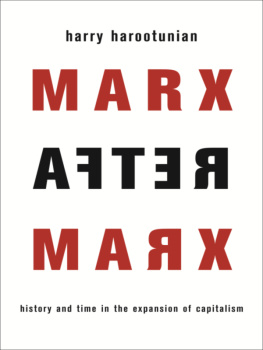Unravelling Capitalism
A Guide to Marxist Political Economy
Second edition
Joseph Choonara
Acknowledgements
Alex Callinicos, Mark Thomas and Jennifer Braunlich read the draft of the first edition. So too did my much missed comrade Chris Harman, who, more than anyone, introduced me to the concepts outlined here and who died suddenly in 2009. I owe them each a debt for encouraging me to write this book, and for their corrections and suggestions at various stages of its production. The new edition is substantially revised and updated, drawing on some of the mass of writing by Marxists over the past decade and taking into account what I have learnt from the course of a crisis that, when I wrote the earlier version, was still in its infancy. Thanks also to Lina Nicolli, Peter Robinson and Carol Williams for their work on the production.
About the author
Joseph Choonara is a columnist on Socialist Review and a frequent contributor to the journal International Socialism.
Unravelling Capitalism
A Guide to Marxist
Political Economy
Second edition
Joseph Choonara

Unravelling Capitalism:
A Guide to Marxist Political Economy
By Joseph Choonara
First published 2009
This edition published 2017
Bookmarks Publications
c/o 1 Bloomsbury Street, London WC1B 3QE
Bookmarks Publications
Cover design and typesetting by Peter Robinson
Printed by Short Run Press Ltd
ISBN print edition 978-1-910885-44-4
Kindle 978-1-910885-45-1
ePub 978-1-910885-46-8
PDF 978-1-910885-47-5
Contents
Introduction to the 2017 edition
The failures of capitalism have provoked a growing interest in Marxist political economy. That was true when the first edition of this work was written towards the end of 2008, just after the collapse of the Lehman Brothers bank trigged what the International Monetary Fund called the largest financial shock since the Great Depression. It is even more so in 2017, after almost a decade of sluggish growth, repeated financial panics and a horrific onslaught against on those living and labouring under the capitalist system.
In those early years of the crisis I argued, first, that a series of bubbles in the world economy had masked what, from a Marxist perspective, had been apparent for many years: the poor underlying health of the economy compared to the sustained period of growth in the 1950s and 1960s. The depth and prolonged nature of the crisis that followed the bursting of the US housing bubble in 2007 confirm that judgement.
Second, I claimed that those at the commanding heights of the US Federal Reserve, the British Treasury, and the boardrooms of banks and multinationals had no coherent theory of their own system, instead swinging from wild panic to glib optimism. This too has been borne out by events. Some among the ranks of mainstream economists even acknowledge it. Willem Buiter, a London School of Economics professor and former member of the Bank of England Monetary Policy Committee, wrote as early as 2009: The typical graduate macroeconomics and monetary economics training received at Anglo-American universities during the past 30 years or so may have set back by decades serious investigations of aggregate economic behaviour and economic policy-relevant understanding. It was a privately and socially costly waste of time and other resources.
Third, I pointed out that politics is, as Lenin wrote, concentrated economics, that crisis exacerbates all the political divisions within the system. Splits and infighting would erupt both within the ruling class over how to solve the crisis and between different national ruling classes as they sought to shift the burden of the crisis onto each other, intensifying inter-imperialist tensions. Simultaneously, every ruling class would seek to make its own working class pay for the crisis. Tragically, this too has proved to be the case. In Britain workers have experienced their first decade-long fall in real wages since the 1860s or since Karl Marx was scribbling at the British Library as Bank of England Governor Mark Carney put it. Other countries such as Greece have seen social and economic devastation comparable with that suffered during the Great Depression. At the same time sharp conflicts have emerged between different groups among the global ruling classesreflected in the incoherence of the response to the crisis in the European Union or the growing antagonisms between the USA and China.
The recent acute failures of capitalism are compounding its longer-term chronic failures. This is expressed most sharply by the fate of those in the poorer countries, now all drawn firmly into the capitalist sphere. According to the United Nations, about 836 million people currently live in extreme poverty, surviving on the equivalent of less than US$1.25 a day. Behind such dry statistics stand untold suffering and misery, matched only by the heroic resistance of workers in countries of the Arab World, Latin America and China in recent years.
The horror of life for the majority in what is known as the Global South finds an echo even in the wealthiest parts of the system. In Britain, still the fifth richest economy in the world, a third of all children are brought up in poverty (defined as households with less than half the average income). Workers suffer increased stress and long hours. Meanwhile a tiny minority have accumulated riches on a scale never seen before. Oxfam revealed in 2016 that the poorest 50 percent of the worlds population share the same wealth as the wealthiest eight billionaires. The sharp division between rich and poor is echoed in every society. The Global South boasts its own contingent of the super-rich who are part of the global capitalist elite.
However, to simply assemble facts and to rail against them is not enough. These issues must be tied to a wider projectto explain the workings and malfunctionings of the capitalist system, to understand its strengths and its vulnerabilities and ultimately to seek its overthrow. Marxism is not a recipe book that can magically solve any of these problems. But it is an indispensable set of tools at the service of a movement with these aims. The growing interest in Marxist economics is not misplaced. The aim of this work is to address that interest, introducing Marxs ideas and showing, at least in outline, how they can be applied to the capitalist system today.
PART 1
Understanding the system
A system that hides its secrets
In 1872 Karl Marx dashed off a letter applauding plans to publish a French edition of the first volume of Capital in serial form. In this form the book will be more accessible to the working class, a consideration that outweighs everything else, Marx wrote.
Capital is rather different from traditional treatises on economics. There are passages that drip with venom:
Within the capitalist system, all methods for raising the social productiveness of labour are put into effect at the cost of the individual worker... They distort the worker into a fragment of a man, they degrade him to the level of an appendage of a machine, they destroy the actual content of his labour by turning it into a torment...they deform the conditions under which he works, subject him during the labour process to a despotism the more hateful for its meanness.
The three volumes of Capital produced by Marx were written with a single purpose: to grasp capitalisms laws of motion in order to hasten its overthrow. The main audience was the group in society that Marx saw as key to overthrowing capitalismthe emerging working class. But he feared that readers might be disheartened by their attempts to grapple with
Next page
